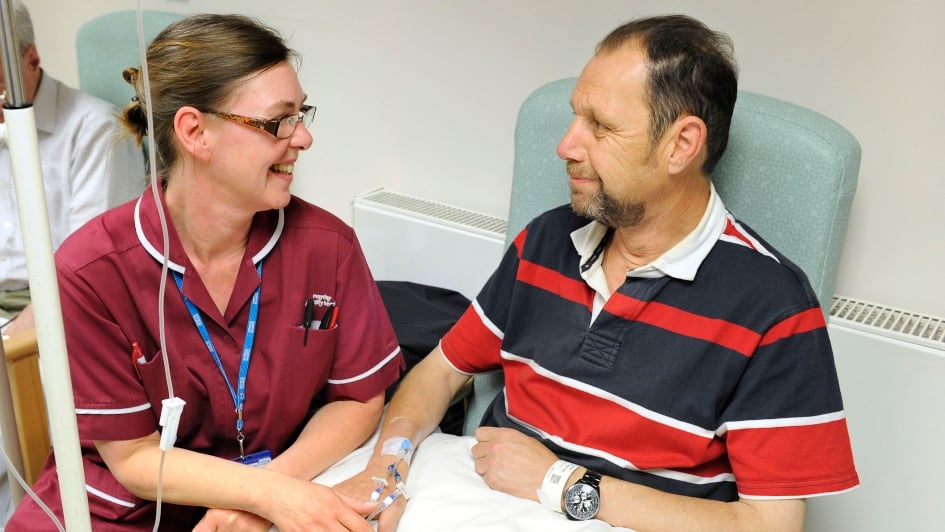
Clinical trials are an essential step to answer questions about the safety and efficacy of any kind of therapy, and developing new and improved options for patients.
One key element to a trial of a new treatment is establishing how people might react to it. By laying out the full scope of possible symptoms experienced by patients, clinicians are able to assess how well a new treatment is tolerated – which influences whether or not it progresses to further trials, and ultimately to clinical practice.
A phase I trial is the first step in testing a new therapy in patients. It establishes the recommended dose of a therapy, so any adverse events that are missed or under-reported at this stage could increase the likelihood of patients experiencing unpleasant side effects in later trials.
Patient symptoms are usually assessed in phase I trials by clinicians only, while later phases tend to also incorporate a patient’s own account of their quality of life and symptoms, known as patient-reported outcomes (PROs).
Could PROs play a role in informing whether a therapy is tolerable in early phase trials?
This is an idea that Professor Christina Yap is investigating at the ICR, which she joined in 2019. As an expert in clinical trials and biostatistics, Professor Yap is all too familiar with the existing gaps in early-phase clinical trial practice, and is working to transform the landscape by redesigning conventional procedures to get the very most out of trials.
Patient voice
PROs are an important case in point. When it comes to selecting tolerable doses and regimens, the patient voice is important: up to half of symptomatic adverse events may be missed by clinicians compared to patients’ own reports, leading to underestimates of treatment toxicities. Some, such as fatigue, are difficult to observe.
That’s a critical hurdle to overcome, as early-phase research has ramifications for patient care and treatment further down the line.
To address this problem, Professor Yap and other cancer researchers (including collaborators from the Drug Development Unit based at the ICR and The Royal Marsden NHS Foundation Trust) are advocating to include the voice of the patient at earlier stages in clinical trials, to report on their experience. This means that clinicians stand a better chance of identifying every symptom, as well as understanding which ones could delay drug development.
“Using PROs in early phases makes sense for several reasons,” says Professor Yap. “It’s more informative than a clinician’s interpretation alone and patients have been shown to be not only willing to self-report, but also likely to adhere to it.
“What we’re trying to promote is that besides using clinician-assessed adverse events, those reported by patients would be very helpful to assess tolerability of treatment. It’s thinking about how we can best make use of PROs as a measure of research and potentially incorporate them into standard clinical trial practice.”
Into the unknown
Professor Yap’s interest in this area has led her to conduct a global survey among a range of stakeholders – including clinicians, clinical trial managers, statisticians, funders and regulators, as well as patients and carers – to get an idea of how people would react to using PROs in phase I trials in the future. Early results suggest that stakeholders are open to using PROs, though research into how PROs would benefit these stages is still very limited.
“In the UK, there are very few phase I trials that use PROs currently. What’s interesting is that there is increasing interest,” says Professor Yap. “But there are definitely challenges out there.”
One of these is the potentially greater burden on patients to fill out PRO forms regularly, and staff to analyse and interpret them, as well as the question of how long patients would be prepared to do so. It can be difficult to convince some that PROs are actually useful too – since most early-phase trials aren’t randomised, there might be bias in patient’s reporting of symptoms, such as under-reporting or over-reporting symptoms. What’s more, there’s still no guidance out there on how best to use PROs in this setting.
“In early phase trials, there’s a lot more to think about compared to late phase, such as whether the PROs are provided to clinicians in real-time – so they impact patient care straight away – or if they should be looked at when making decisions at the end of phase I,” explains Professor Yap. “That’s why there’s such a huge gap in this research and actually, a huge need for it.”
Future promise
There have been some promising recent developments, however. PRO-CTCAE is a version of the clinical trials standard Common Terminology Criteria for Adverse Events with the added baseline of PROs, introduced by the National Cancer Institute to address precisely this gap. Cancer patients answer questions about a range of possible adverse symptoms to better understand how they tolerate drugs in trials.
Now, PRO-CTCAE is widely used in oncology drug development programmes but still predominantly in later-phase trials. The challenge remains to get PROs incorporated into cancer trials early, and make a convincing case for their use – and Professor Yap’s research is helping to take a significant step in that direction.
“Ultimately, PROs do greatly help to inform a patient’s general cancer care”, she says. “I think that’s important and warrants a new perspective, despite the limitations.”
